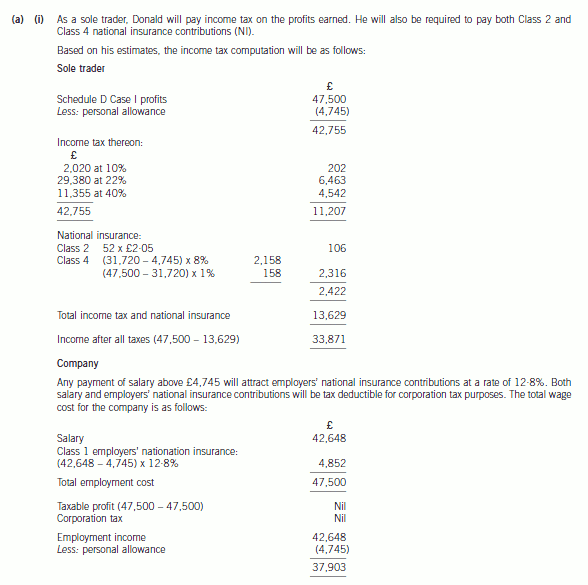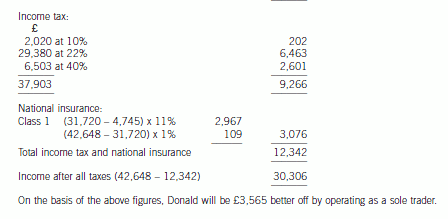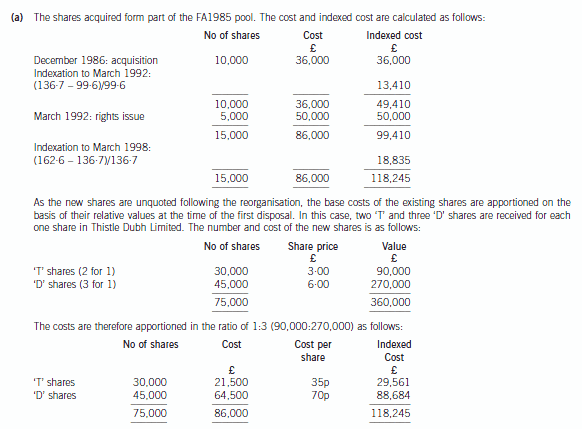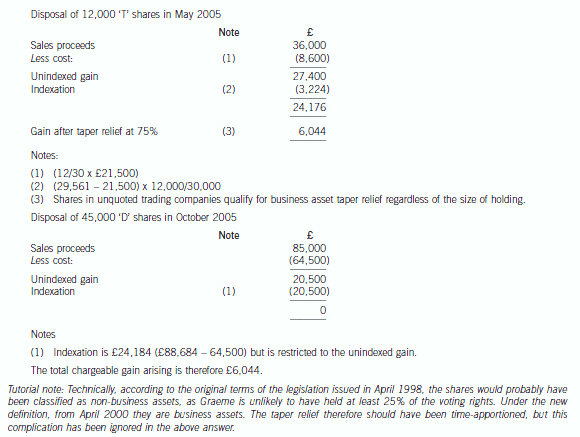2 Assume that today’s date is 1 July 2005.
Jan is aged 45 and single. He is of Danish domicile but has been working in the United Kingdom since 1 May 2004
and intends to remain in the UK for the medium to long term. Although Jan worked briefly in the UK in 1986, he
has forgotten how UK taxation works and needs some assistance before preparing his UK income tax return.
Jan’s salary from 1 May 2004 was £74,760 per annum. Jan also has a company car – a Jaguar XJ8 with a list price
of £42,550 including extras, and CO2 emissions of 242g/km. The car was available to him from 1 July 2004. Free
petrol is provided by the company. Jan has other taxable benefits amounting to £3,965.
Jan’s other 2004/05 income comprises:
£
Dividend income from UK companies (cash received) 3,240
Interest received on an ISA account 230
Interest received on a UK bank account 740
Interest remitted from an offshore account (net of 15% withholding tax) 5,100
Income remitted from a villa in Portugal (net of 45% withholding tax) 4,598
The total interest arising on the offshore account was £9,000 (gross). In addition, Jan has not remitted other
Portuguese rental income arising in the year, totalling a further £1,500 (gross).
Jan informs you that his employer is thinking of providing him with rented accommodation while he looks for a house
to buy. The accommodation would be a two bedroom flat, valued at £155,000 with an annual value of £6,000. It
would be made available from 6 August 2005. The company will pay the rent of £600 per month for the first six
months. All other bills will be paid by Jan.
Jan also informs you that he has 25,000 ordinary shares in Gilet Ltd (‘Gilet’), an unquoted UK trading company. He
has held these shares since August 1986 when he bought 2,500 shares at £4.07 per share. In January 1994, a
bonus issue gave each shareholder nine shares for each ordinary share held. In the last week all Gilet’s shareholders
have received an offer from Jumper plc (‘Jumper’) who wishes to acquire the shares. Jumper has offered the following:
– 3 shares in Jumper (currently trading at £3.55 per share) for every 5 shares in Gilet, and
– 25p cash per share
Required:
(a) Calculate Jan’s 2004/05 income tax (IT) payable. (11 marks)
第1题:
For this part, assume today’s date is 15 August 2005.
5 (a) Donald is aged 22, single, and about to finish his university education. He has plans to start up a business selling
computer games, and intends to start trading on 1 April 2006, making up accounts to 31 March annually.
He believes that his business will generate cash (equal to taxable profits) of £47,500 in the first year. He
originally intended to operate as a sole trader, but he has recently discovered that as an alternative, he could
operate through a company. He has been advised that if this is the case, he can take a maximum gross salary
of £42,648 out of the company.
Required:
(i) Advise Donald on the income tax (IT), national insurance (NIC) and corporation tax (CT) liabilities he
will incur for the year ended 31 March 2007 trading under each of the two alternative business
structures (sole trade/company). Your advice should be supported by calculations of disposable income
for both alternatives assuming that in the company case, he draws the maximum salary stated.
(7 marks)


第2题:
4 Assume today’s date is 15 May 2005.
In March 1999, Bob was made redundant from his job as a furniture salesman. He decided to travel round the world,
and did so, returning to the UK in May 2001. Bob then decided to set up his own business selling furniture. He
started trading on 1 October 2001. After some initial success, the business made losses as Bob tried to win more
customers. However, he was eventually successful, and the business subsequently made profits.
The results for Bob’s business were as follows:
Period Schedule D Case I
Trading Profits/(losses)
£
1 October 2001 – 30 April 2002 13,500
1 May 2002 – 30 April 2003 (18,000)
1 May 2003 – 30 April 2004 28,000
Bob required funds to help start his business, so he raised money in three ways:
(1) Bob is a keen cricket fan, and in the 1990s, he collected many books on cricket players. To raise money, Bob
started selling books from his collection. These had risen considerably in value and sold for between £150 and
£300 per book. None of the books forms part of a set. Bob created an internet website to advertise the books.
Bob has not declared this income, as he believes that the proceeds from selling the books are non-taxable.
(2) He disposed of two paintings and an antique silver coffee set at auction on 1 December 2004, realising
chargeable gains totalling £23,720.
(3) Bob took a part time job in a furniture store on 1 January 2003. His annual salary has remained at £12,600
per year since he started this employment.
Bob has 5,000 shares in Willis Ltd, an unquoted trading company based in the UK. He subscribed for these shares
in August 2000, paying £3 per share. On 1 December 2004, Bob received a letter informing him that the company
had gone into receivership. As a result, his shares were almost worthless. The receivers dealing with the company
estimated that on the liquidation of the company, he would receive no more than 10p per share for his shareholding.
He has not yet received any money.
Required:
(a) Write a letter to Bob advising him on whether or not he is correct in believing that his book sales are nontaxable.
Your advice should include reference to the badges of trade and their application to this case.
(9 marks)
第3题:
2 Graeme, aged 57, is married to Catherine, aged 58. They work as medical consultants, and both are higher rate
taxpayers. Barry, their son, is aged 32. Graeme, Catherine and Barry are all UK resident, ordinarily resident and
domiciled. Graeme has come to you for some tax advice.
Graeme has invested in shares for some time, in particular shares in Thistle Dubh Limited. He informs you of the
following transactions in Thistle Dubh Limited shares:
(i) In December 1986, on the death of his grandmother, he inherited 10,000 £1 ordinary shares in Thistle Dubh
Limited, an unquoted UK trading company providing food supplies for sporting events. The probate value of the
shares was 360p per share.
(ii) In March 1992, he took up a rights issue, buying one share for every two held. The price paid for the rights
shares was £10 per share.
(iii) In October 1999, the company underwent a reorganisation, and the ordinary shares were split into two new
classes of ordinary share – ‘T’ shares and ‘D’ shares, each with differing rights. Graeme received two ‘T’ and three
‘D’ shares for each original Thistle Dubh Limited share held. The market values for the ‘T’ shares and the ‘D’
shares on the date of reorganisation were 135p and 405p per share respectively.
(iv) On 1 May 2005, Graeme sold 12,000 ‘T’ shares. The market values for the ‘T’ shares and the ‘D’ shares on that
day were 300p and 600p per share respectively.
(v) In October 2005, Graeme sold all of his ‘D’ shares for £85,000.
(vi) The current market value of ‘T’ shares is 384p per share. The shares remain unquoted.
Graeme and Catherine have owned a holiday cottage in a remote part of the UK for many years. In recent years, they
have used the property infrequently, as they have taken their holidays abroad and the cottage has been let out as
furnished holiday accommodation.
Graeme and Catherine are now considering selling the UK country cottage and purchasing a holiday villa abroad.
Initially they plan to let this villa out on a furnished basis, but following their anticipated retirement, would expect to
occupy the property for a significant part of the year themselves, possibly moving to live in the villa permanently.
Required:
(a) Calculate the total chargeable gains arising on Graeme’s disposals of ‘T’ and ‘D’ ordinary shares in May and
October 2005 respectively. (7 marks)


第4题:
1 Alvaro Pelorus is 47 years old and married to Maria. The couple have two children, Vito and Sophie, aged 22 and
19 years respectively. Alvaro and Maria have lived in the country of Koruba since 1982. On 1 July 2005 the family
moved to the UK to be near Alvaro’s father, Ray, who was very ill. Alvaro and Maria are UK resident, but not ordinarily
resident in the tax years 2005/06 and 2006/07. They are both domiciled in the country of Koruba.
On 1 February 2007 Ray Pelorus died. He was UK domiciled, having lived in the UK for the whole of his life. For the
purposes of inheritance tax, his death estate consisted of UK assets, valued at £870,000 after deduction of all
available reliefs, and a house in the country of Pacifica valued at £94,000. The executors of Ray’s estate have paid
Pacifican inheritance tax of £1,800 and legal fees of £7,700 in respect of the sale of the Pacifican house. Ray left
the whole of his estate to Alvaro.
Ray had made two gifts during his lifetime:
(i) 1 May 2003: He gave Alvaro 95 acres of farm land situated in the UK. The market value of the land was
£245,000, although its agricultural value was only £120,000. Ray had acquired the land on
1 January 1996 and granted an agricultural tenancy on that date. Alvaro continues to own the
land as at today’s date and it is still subject to the agricultural tenancy.
(ii) 1 August 2005: He gave Alvaro 6,000 shares valued at £183,000 in Pinger Ltd, a UK resident trading
company. Gift relief was claimed in respect of this gift. Ray had acquired 14,000 shares in
Pinger Ltd on 1 April 1997 for £54,600.
You may assume that Alvaro is a higher rate taxpayer for the tax years 2005/06 and 2006/07. In 2006/07 he made
the following disposals of assets:
(i) On 1 July 2006 he sold the 6,000 shares in Pinger Ltd for £228,000.
(ii) On 1 September 2006 he sold 2,350 shares in Lapis Inc, a company resident in Koruba, for £8,270. Alvaro
had purchased 5,500 shares in the company on 1 September 2002 for £25,950.
(iii) On 1 December 2006 he transferred shares with a market value of £74,000 in Quad plc, a UK quoted company,
to a UK resident discretionary trust for the benefit of Vito and Sophie. Alvaro had purchased these shares on
1 January 2006 for £59,500.
Alvaro has not made any other transfers of value for the purposes of UK inheritance tax. He owns the family house
in the UK as well as shares in UK and Koruban companies and commercial rental property in the country of Koruba.
Maria has not made any transfers of value for the purposes of UK inheritance tax. Her only significant asset is the
family home in the country of Koruba.
Alvaro and his family expect to return to their home in the country of Koruba in October 2007 once Ray’s affairs have
been settled. There is no double taxation agreement between the UK and Koruba.
Required:
(a) Calculate the inheritance tax (IHT) payable as a result of the death of Ray Pelorus. Explain the availability
or otherwise of agricultural property relief and business property relief on the two lifetime gifts made by Ray.
(8 marks)


第5题:
(b) Peter, one of Linden Limited’s non-executive directors, having lived and worked in the UK for most of his adult
life, sold his home near London on 22 March 2006 and, together with his wife (a French citizen), moved to live
in a villa which she owns in the south of France. Peter is now demanding that the tax deducted from his director’s
fees, for the board meetings held on 18 April and 16 May 2006, be refunded, on the grounds that, as he is no
longer resident in the UK, he is no longer liable to UK income tax. All of the company’s board meetings are held
at its offices in Cambridge.
Despite Peter’s assurance that none of the other companies of which he is a director has disputed his change of
tax status, Damian is uncertain whether he should make the refunds requested. However, as Peter is a friend of
the company’s founder, Linden Limited’s managing director is urging him to do so, stating that if the tax does
have to be paid, then Linden Limited could always bear the cost.
Required:
Advise Damian whether Peter is correct in his assertion regarding his tax position and in the case that there
is a UK tax liability the implications of the managing director’s suggestion. You are not required to consider
national insurance (NIC) issues. (4 marks)
第6题:
(b) (i) Calculate the inheritance tax (IHT) that will be payable if Debbie were to die today (8 June 2005).
Assume that no tax planning measures are taken and that there has been no change in the value of any
of the assets since David’s death. (4 marks)

第7题:
6 Assume today’s date is 16 April 2005.
Henry, aged 48, is the managing director of Happy Home Ltd, an unquoted UK company specialising in interior
design. He is wealthy in his own right and is married to Helen, who is 45 years old. They have two children – Stephen,
who is 19, and Sally who is 17.
As part of his salary, Henry was given 3,000 shares in Happy Home Ltd with an option to acquire a further 10,000
shares. The options were granted on 15 July 2003, shortly after the company started trading, and were not part of
an approved share option scheme. The free shares were given to Henry on the same day.
The exercise price of the share options was set at the then market value of £1·00 per share. The options are not
capable of being exercised after 10 years from the date of grant. The company has been successful, and the current
value of the shares is now £14·00 per share. Another shareholder has offered to buy the shares at their market value,
so Henry exercised his share options on 14 April 2005 and will sell the shares next week, on 20 April 2005.
With the company growing in size, Henry wishes to recruit high quality staff, but the company lacks the funds to pay
them in cash. Henry believes that giving new employees the chance to buy shares in the company would help recruit
staff, as they could share in the growth in value of Happy Home Ltd. Henry has heard that there is a particular share
scheme that is suitable for small, fast growing companies. He would like to obtain further information on how such
a scheme would work.
Henry has accumulated substantial assets over the years. The family house is owned jointly with Helen, and is worth
£650,000. Henry has a £250,000 mortgage on the house. In addition, Henry has liquid assets worth £340,000
and Helen has shares in quoted companies currently worth £125,000. Henry has no forms of insurance, and believes
he should make sure that his wealth and family are protected. He is keen to find out what options he should be
considering.
Required:
(a) (i) State how the gift of the 3,000 shares in Happy Home Ltd was taxed. (1 mark)
第8题:
4 Assume today’s date is 5 February 2006.
Joanne is 37, she was born and until 2005 had lived all her life in Germany. She recently married Fraser, aged 38,
who is a UK resident, but who worked briefly in Germany. They have no children.
The couple moved to the UK to live permanently on 9 October 2005. Joanne was employed by an American company
in Germany, and she continued to work for them in the UK until the end of November 2005. Her earnings from the
American company were £5,000 per month. Joanne has not remitted any of the income she earned in Germany prior
to her arrival in the UK.
Joanne resigned from her job at the end of November 2005. The company did not hold her to the three months notice
stipulated in her contract, but still paid her for that period. In total, Joanne paid £4,200 in UK income tax under PAYE
for the tax tear 2005/06.
Joanne also wishes to sell the shares she holds in a German listed company. The shareholding cost the equivalent of
£3,500 in September 1986, and its current value is £21,500. She intends to sell the shares in March 2006 and to
invest the proceeds from the sale in the UK. Joanne has made no other capital disposals in the year.
Prior to her leaving employment, Joanne investigated the possibility of starting her own business providing a German
translation service for UK companies, and took some advice on the matter. She paid consultancy fees of £5,000
(excluding value added tax (VAT)) and bought a computer for £2,000 (excluding VAT), both on 23 October 2005.
Joanne started trading on 1 December 2005. She made sales of £2,000 in December, and estimates that her sales
will rise by £1,000 every month to a maximum of £7,000 per month. Joanne believes that her monthly expenses of
£400 (excluding VAT) will remain constant. Her year end will be 31 March, and the first accounts will be drawn up
to 31 March 2006.
Although Joanne has registered her business for tax purposes with the Revenue, she has not registered for VAT and
is unsure what is required of her in this respect.
Required:
(a) State, giving reasons, whether Joanne will be treated as resident or non-resident in the UK for the year of
assessment 2005/06, together with the basis on which her income and gains of that year will be subject to
UK taxation. (3 marks)
第9题:
6 Andrew is aged 38 and is single. He is employed as a consultant by Bestadvice & Co and pays income tax at the
higher rate.
Andrew is considering investing in a new business, and to provide funds for this investment he has recently disposed
of the following assets:
(1) A short leasehold interest in a residential property. Andrew originally paid £50,000 for a 47 year lease of the
property in May 1995, and assigned the lease in May 2006 for £90,000.
(2) His holding of £10,000 7% Government Stock, on which interest is payable half-yearly on 20 April and
20 October. Andrew originally purchased this holding on 1 June 1999 for £9,980 and he sold it for £11,250
on 14 March 2005.
Andrew intends to subscribe for ordinary shares in a new company, Scalar Limited, which will be a UK based
manufacturing company. Three investors (including Andrew) have been identified, but a fourth investor may also be
invited to subscribe for shares. The investors are all unconnected, and would subscribe for shares in equal measure.
The intention is to raise £450,000 in this manner. The company will also raise a further £50,000 from the investors
in the form. of loans. Andrew has been told that he can take advantage of some tax reliefs on his investment in Scalar
Limited, but does not know anything about the details of these reliefs
Andrew’s employer, Bestadvice & Co, is proposing to change the staff pension scheme from a defined benefit scheme
to which the firm and the employees each contribute 6% of their annual salary, to a defined contribution scheme, to
which the employees will continue to contribute 6%, but the firm will contribute 8% of their annual salary. The
majority of Andrew’s colleagues are opposed to this move, but, given the increase in the firm’s contribution rate
Andrew himself is less sure that the proposal is without merit.
Required:
(a) (i) Calculate the chargeable gain arising on the assignment of the residential property lease in May 2006.
(2 marks)

第10题:
3 Spica, one of the director shareholders of Acrux Ltd, has been in dispute with the other shareholders over plans to
expand the company’s activities overseas. In order to resolve the position it has been agreed that Spica will sell her
shares back to the company. Once the purchase of her shares has taken place, the company intends to establish a
number of branches overseas and acquire a shareholding in a number of companies that are resident and trade in
overseas countries.
The following information has been obtained from client files and meetings with the parties involved.
Acrux Ltd:
– An unquoted UK resident company.
– Share capital consists of 50,000 ordinary shares issued at £1·90 per share in July 2000.
– None of the other shareholders has any connection with Spica.
The purchase of own shares:
– The company will purchase all of Spica’s shares for £8 per share.
– The transaction will take place by the end of 2008.
Spica:
– Purchased 8,000 shares in Acrux Ltd for £2 per share on 30 September 2003.
– Has no income in the tax year 2008/09.
– Has chargeable capital gains in the tax year 2008/09 of £3,800.
– Has houses in the UK and the country of Solaris and divides her time between them.
Investment in non-UK resident companies:
– Acrux Ltd will acquire between 15% and 20% of each of the non-UK resident companies.
– The companies will not be controlled foreign companies as the rates of tax in the overseas countries will be
between 23% and 42%.
– There may or may not be a double tax treaty between the UK and the overseas countries in which the companies
are resident. Where there is a treaty, it will be based on the OECD model treaty.
– None of the countries concerned levy withholding tax on dividends paid to UK companies.
– The directors of Acrux Ltd are concerned that the rate of tax suffered on the profits of the overseas companies
will be very high as they will be taxed in both the overseas country and in the UK.
Required:
(a) (i) Prepare detailed calculations to determine the most beneficial tax treatment of the payment Spica will
receive for her shares; (7 marks)
